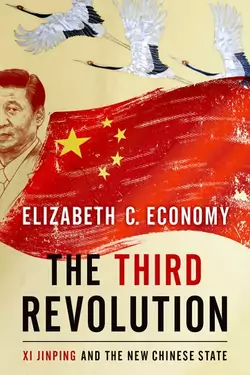
The Third Revolution
Xi Jinping and the New Chinese State

The Third Revolution argues that Xi Jinping’s dual-reform trajectories—a more authoritarian system at home and a more ambitious foreign policy abroad—provide Beijing with new levers of influence that the United States must learn to exploit to protect its own interests.
- Book
- Foreign policy analyses written by CFR fellows and published by the trade presses, academic presses, or the Council on Foreign Relations Press.
Read an excerpt from The Third Revolution.
The new paperback edition includes updates since 2018 on Chinese domestic political and economic events as well as changes in U.S.-China relations.
More on:
“One of the great paradoxes of China today,” writes eminent China scholar Elizabeth C. Economy, “is Xi Jinping’s effort to position himself as a champion of globalization, while at the same time restricting the free flow of capital, information, and goods between China and the rest of the world.” In her new book, The Third Revolution: Xi Jinping and the New Chinese State, Economy explains that “the ultimate objective of Xi’s revolution is his Chinese Dream—the rejuvenation of the great Chinese nation.”
Characterized by “a reassertion of the state in Chinese political and economic life at home, and a more ambitious and expansive role for China abroad,” Xi’s China is exercising “new levers of influence and power that others will have to learn to exploit and counter to protect and advance their own interests,” warns Economy, C. V. Starr senior fellow and director of Asia Studies at CFR.
Xi has reversed the thirty years of reform and opening initiated by former Chinese leader Deng Xiaoping’s Second Revolution and replaced it with his own Third Revolution, she writes. “What makes Xi’s revolution distinctive is the strategy he has pursued: the dramatic centralization of authority under his personal leadership; the intensified penetration of society by the state; the creation of a virtual wall of regulations and restrictions that more tightly controls the flow of ideas, culture, and capital into and out of the country; and the significant projection of Chinese power.”
“An illiberal state seeking leadership in a liberal world order,” China poses a set of distinct new challenges for the United States. Xi “seeks to project the current Chinese political and economic development model globally,” and to “become a standard bearer for other countries disenchanted with the American and European models of liberal democracy.” While China “takes advantage of the openness of the United States and other market-based liberal democracies to further its economic interests and advance its political and cultural influence,” it “increasingly constrains opportunities” for other countries to do the same.
“The United States . . . must continue to seek opportunities for cooperation but at the same time be prepared to counter and confront China when Xi’s Third Revolution spills over into the rest of the world, undermining the principles underpinning global security and prosperity it purports to uphold,” she writes.
More on:
Economy urges the United States to adopt a strategic framework for its relationship with China that establishes U.S. priorities and the diplomatic, economic, and military approaches necessary to realize them, “[retaining] what has worked well for its policy toward China while adapting to a new political reality.” She offers several recommendations to U.S. policymakers:
- Leverage Xi’s ambition for leadership and “[encourage] China to do more on the global stage,” such as addressing the global refugee crisis and ensuring that its global development strategy, the Belt and Road Initiative, adopts better governance practices.
- Advance technical cooperation between China and the United States around the big issues of global governance “to build an institutional infrastructure for cooperation.”
- Work with U.S. allies and partners in Asia and Europe to support the underlying principles of a “free and open Indo-Pacific, rooted in a rules-based order” by revisiting “U.S. participation in the [Trans-Pacific Partnership],” deterring “further efforts by China to realize its sovereignty claims through unilateral actions” in the South China Sea and Taiwan, and developing “programs that build good governance capacity” such as the rule of law, in countries such as Ethiopia and Pakistan, where Chinese political influence is expanding.
- When U.S. political, economic, or security interests are “directly and meaningfully undermined,” adopt firmer policies such as economic retaliation and reciprocal action, “making clear to China the costs of noncompliance with agreements or established norms.”
- Prioritize U.S. government support for the “development and adoption of new technologies” to compete effectively with Made in China 2025 and other innovation-driven industrial policies.
- Support through “both word and deed,” fundamental values including “democracy and respect for human rights, a market economy, and free trade.”
“China cannot be a leader in a globalized world while at the same time closing its borders to ideas, capital, and influences from the outside world,” Economy concludes.
A Council on Foreign Relations Book
Educators: Access Teaching Notes for The Third Revolution.
In the News
Jaw-Jaw: Will Xi's Third Revolution Last?War on the Rocks
Economy: China Was Surprised by U.S. Threat of TariffsBloomberg
Xi Jinping and the Third Chinese RevolutionThe Diplomat
What Happens After You Threaten Tariffs?MSNBC
The Difficulty in Parsing Trump's Views on TradeBloomberg
 Online Store
Online Store